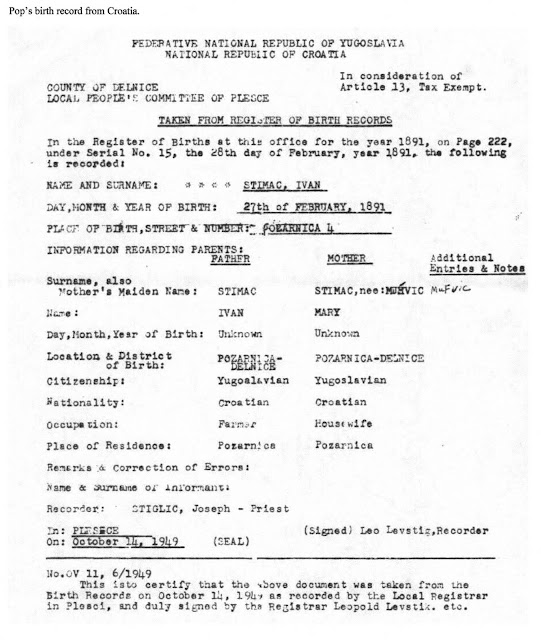 |
| The Croatian Flag |
 |
| Ivan "Pop" Stimach |
Pop described his father as being "over six feet tall with brown hair" and his mother as being "tall with black hair and a round face." In Pozarnica, Ivan Sr. worked in timber and farming, but by the early 1900s he was unable to work due to old age and Mary had to support the family financially.
Pop's older brothers came to the U.S. seeking work in the lumber industry and on October 20, 1908, Pop immigrated on the French ship the "Lan Reniere" though New Orleans. His son, Edward Frank stated, "I remember Pop saying when he left home, his mother accompanied him to the train station in an ox cart. He took the train to France where he departed for the United States." He was only seventeen years old at the time and had to borrow money for the trip from Anthony. The trip had cost him $250 and Pop had to pay his brother 40% interest on the loan.
On board the ship, they served a type of pita bread with meat and onions. The meal was also wrapped in tin foil. Pop had never seen tin foil before and ate the first one, tin foil and all. He wasn't impressed with the taste.
Once, while waiting for a train shortly after coming to the U.S., he noticed a young boy selling a large basket of apples. Pop was hungry and only wanted one apple. He only had a five dollar bill, which was a lot of money in those days, but he hadn't yet learned enough English to communicate well. He approached the boy intending to buy one apple and pointed to the basket of apples and held out the five dollar bill. The boy was very happy as he took the money and ran off leaving Pop with a large basket of apples. Needless to say, Pop ate a lot of apples for the next week or so.
Pop found work as a lumberjack about seventy-five miles from Oaksgrove, Louisiana, where he stayed and worked for four months making $4.00 a day. He would saw down trees and split them into stakes. It was during this time that he began learning the English language. After working for a time in Pine Bluff, Arkansas, Pop met a man named Clepcheck, who worked with Pop as a lumberjack. Clepcheck invited Pop to come and visit his family on Strawberry Hill in Kansas City, Kansas. While visiting, Pop attended a wedding as St. John's Catholic Church and met Mary Stiglich. It was love at first sight as the two were married three months later in 1911.
 | |
| Mary and John Stimach |
Pop's mother died on the day she learned that Pop had married Mary. It's been surmised that she was very upset because she knew that when Pop married in the United States that he probably would not be returning home to Croatia. However, Pop's older brother, Anthony, had sent all the money he had earned home to his wife in Croatia and eventually he returned there. Unfortunately, World War I broke out and Anthony was captured and sent to a Prisoner-of-War camp where he died of lice infestation and disease. Pop's father died the same year.
Pop and Mary lived at 319 Barnett on Strawberry Hill and joined St. John's Church. They made their first major purchase three years into their marriage when they bought a large dresser. Pop had many jobs over the years in Kansas City, Kansas. He worked in construction, stone masonry, and helped build the viaduct connecting K.C., Kansas to K.C., Missouri. During the Great Depression he worked in the Works Program Administration digging ditches and later in a meat packing plant.
Pop and Mary had eleven children. They are John, Stella, Joseph, Frank, Mary, Anthony, Peter, Helen, Edward, Albert, and Ernest. Peter, however, died only two days old in 1920.
When World War II broke out in Asia and in Europe, the Stimach boy's rushed to join up. Anthony became a Sergeant in the Army and was stationed with the 385th Fighter Squadron of the 8th Army Air Corps in England and France. Frank joined the navy and served twenty-three months in the South Pacific on the USS Saratoga. Edward served seven months with the army in Panama and later hunted Japanese spies on the Hawaiian Islands. Joe was a Sergeant and was wounded in France in 1944 while serving with Patton's 35th Division of the 3rd Army Corps. Joe received the Purple Heart, the Presidential Citation, Combat Infantry badge,and the Bronze Star.
 |
| Pop watches his son's go to War. |
Throughout their years together, Pop and Mary stove to build a good family with wholesome values. They also passed on many cultural and familial traditions that are still practiced by their descendants today. Such as making apple strudel and povetitcza (a type of nut and honey bread), making homemade beer and wine, and making many Croatian dishes such as Saldama Balls.
Mary died in 1963, but Pop lived on to see many grand children and great grandchildren. Pop died on January 12, 1986 after having lived almost 95 years.
Pop loved to play the accordion and came to love watching baseball in his later years and his presence can still be felt when you visit Stella, Mary, Helen, or Albert's homes in Kansas City, Kansas. In the early 1980s, the family made a video of Pop talking about his early life and how he came to America and many of his stories about the various "adventures" of his life. It is a wonderful thing to see. He is missed.

No comments:
Post a Comment